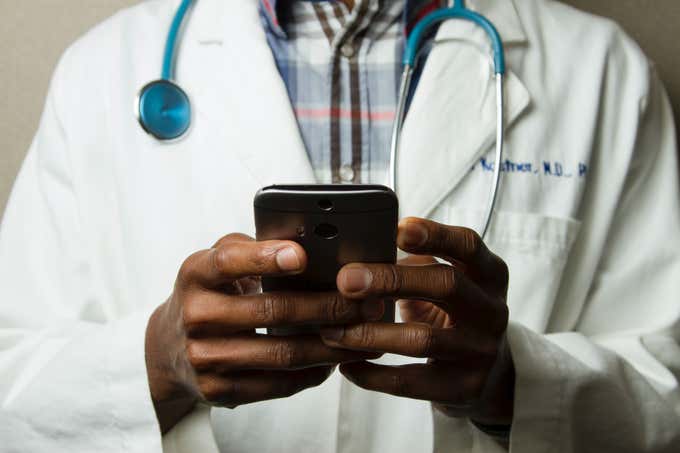Stay updated!
The best customer experience content delivered right to your inbox.
Why Your Practice Needs a HIPAA-Compliant Messaging Platform
by Meg Monk |
Software improvements in the healthcare industry often get hampered by the need for security, privacy, and complicated regulatory requirements such as HIPAA. That means patient care and clinic efficiency can be hamstrung by antiquated technology and legacy, disjointed systems. Secure messaging solutions in the healthcare industry can help solve these issues.
Implementing secure messaging is one way that technology can help healthcare providers communicate effectively with patients while improving record-keeping and information availability.
A December 2020 study found that 71% of physicians use mobile devices in their daily clinical routines to look up information, take notes, and communicate through messages and emails. Healthcare providers can dramatically improve their service by providing physicians and other healthcare workers with easy-to-use messaging systems that meet regulatory requirements.
What is secure messaging in healthcare?
Secure messaging includes multiple forms of communication, including text or SMS messaging, in-app chat, or other messaging apps. Healthcare workers use messaging to provide updates to patients, communicate with other providers or vendors, and update records or take notes. Due to the private nature of the message content, all healthcare communication must be protected as personal health data. That requires adhering to the local messaging standards in healthcare, such as HIPAA or HL7.
What are the messaging standards in healthcare?
Most countries or regions have requirements for how electronic health data gets handled in messaging services. Two of the most prominent regulatory standards to know are HIPAA and HL7:
HIPAA
HIPAA or "The Health Insurance Portability and Accountability Act" is an American federal regulation for the protection of patient data. HIPAA has specific messaging standards for healthcare data, including:
- Encryption of data at rest and end-to-end encryption of data in transit
- Controls to limit access to health data, along with access logs and an audit trail
- Mechanisms to prevent the accidental destruction of health information
- Sanitization of messages when devices are no longer in use
HL7
HL7 or Health Level Seven is an international set of regulations that standardize the security of data transfer between software applications used in the healthcare industry. Whereas HIPAA covers the proper use and storage of all healthcare data, HL7 is the "how" of patient data transfers through programming. Following HL7 ensures interoperability and security between different systems.
Why use secure messaging systems for healthcare communication?
Using HIPAA-compliant messaging platforms for healthcare communications has demonstrated benefits on patient care and operational efficiency. Compared to the legacy systems of desktop computers and paper charts, mobile messaging improves the quality and efficiency of communication.
In 2019, a large radiation oncology clinic undertook a study on the impact of implementing a secure messaging platform. According to the published research paper, survey responses from the staff demonstrated a clear improvement in staff satisfaction with the efficiency, timeliness, effectiveness, and overall quality of communication.
Patients want the ability to securely text message their healthcare provider for privacy and peace of mind. A published review of over 70 journal articles found that patients find messaging systems convenient, time-saving, and useful.
Due to the popularity of messaging among healthcare providers and patients, it's critical that security measures be implemented. If a business doesn't provide work devices equipped with secure messaging channels, professionals often use their own private devices. That can severely impact data protection and patients' confidential health information. A 2020 study in Germany found that almost 79% of healthcare workers who responded to their survey use their personal devices for work purposes almost daily. In other words, if you don't adapt to how people want to work and communicate, they will likely do it anyways – but in an unsafe manner.
Healthcare contact center solutions to meet secure messaging requirements
Using a contact center solution for healthcare communication can take the stress off managing data security. UJET is designed to meet and exceed regulatory standards for secure messaging, so you and your patients can rest easy when it comes to knowing their privacy is maintained. Plus, with automated features like UJET's Virtual Agent and dynamic routing, operational efficiency is ensured.
Learn more about how UJET's CCaaS 3.0 helps healthcare providers deliver secure and efficient patient care that provides an exceptional experience.
The best customer experience content delivered right to your inbox.